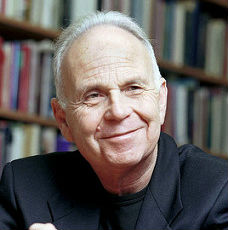I like to think of myself as a rather well-read person, but I had not heard of Stanley Fish until I picked up his latest book. Turns out, he's a bit of a polymath and Dean Emeritus at the School of Liberal Arts and Sciences at UIC, among other posts. While Fish writes a great deal about English literature and law (John Milton is a favorite topic), I plan to focus more on his books about thinking.
Fish wrote a column for the New York Times from 1995 to 2013, and Think Again is a collection of 100 of his favorite pieces. Some readers are a bit confused by his analysis of important topics that don't seem to tell them what to think. To Fish, that's the point. Everyone has an opinion, but how do you arrive at and defend it? While most of his columns deal with hot-button issues, they are counterpointed with the personal, on topics from Frank Sinatra to Judaism. This is probably the book to start with because one can set it down, think a bit, and move on to the next piece.
Fish's latest book is Winning Arguments. He gives plenty of examples of successful negotiating techniques, such as active listening in a marriage or other romantic relationship. One of Fish's most compelling examples of defending an argument is that of climate change deniers, who only need to sow doubt in order to win. Also, Fish not only tells you why some rhetorical gambits work in a certain situation and others don't, he posits the idea that words make the world. You are, in fact, entitled to your own facts. Tis may be the most controversial part of the book, but Fish defends his thesis well.
Stanley Fish's most famous book is probably How to Write A Sentence. Going beyond the standard diagramming that took up your elementary school language arts class, Fish explores why great writing is great writing. He celebrates the masters from Jane Austen to Philip Roth while showing you how to construct a memorable and effective sentence.
Save the World on your Own Time is Fish's argument against the popular academic practice of teaching opinions instead of teaching the study of opinions. You may be against the death penalty, but one has to teach (and study) all the arguments and facts surrounding it and then come to a conclusion. Instructors can have strong opinions on a particular issue, but as experts in a subject and teachers of analysis, they need to leave it outside the classroom. Holding that the true purpose of a college education is to advance the study of a certain topic and not the propagation of a point of view, Fish takes on liberals and conservatives alike in his trademark erudite, conversational tone.
Got an opinion on Stanley Fish's books or ideas? Let us know in the comments.




Add a comment to: The How and the Why: Stanley Fish